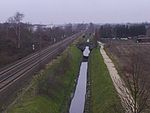Bolten-Brauerei
13th-century establishments in the Holy Roman EmpireBeer brands of GermanyBreweries in Germany

Bolten-Brauerei is a brewery in North Rhine-Westphalia, Germany. It was founded in 1266 when the Lord of Myllendonk authorised the brewing of beer at the current site in Korschenbroich and claims to be the oldest altbier brewery in the world. In 2011 it produced about 50,000 hectoliters of beer.
Excerpt from the Wikipedia article Bolten-Brauerei (License: CC BY-SA 3.0, Authors, Images).Bolten-Brauerei
Rheydter Straße,
Geographical coordinates (GPS) Address Nearby Places Show on map
Geographical coordinates (GPS)
| Latitude | Longitude |
|---|---|
| N 51.183333333333 ° | E 6.4991666666667 ° |
Address
Rheydter Straße 138
41352 (Korschenbroich)
North Rhine-Westphalia, Germany
Open on Google Maps








